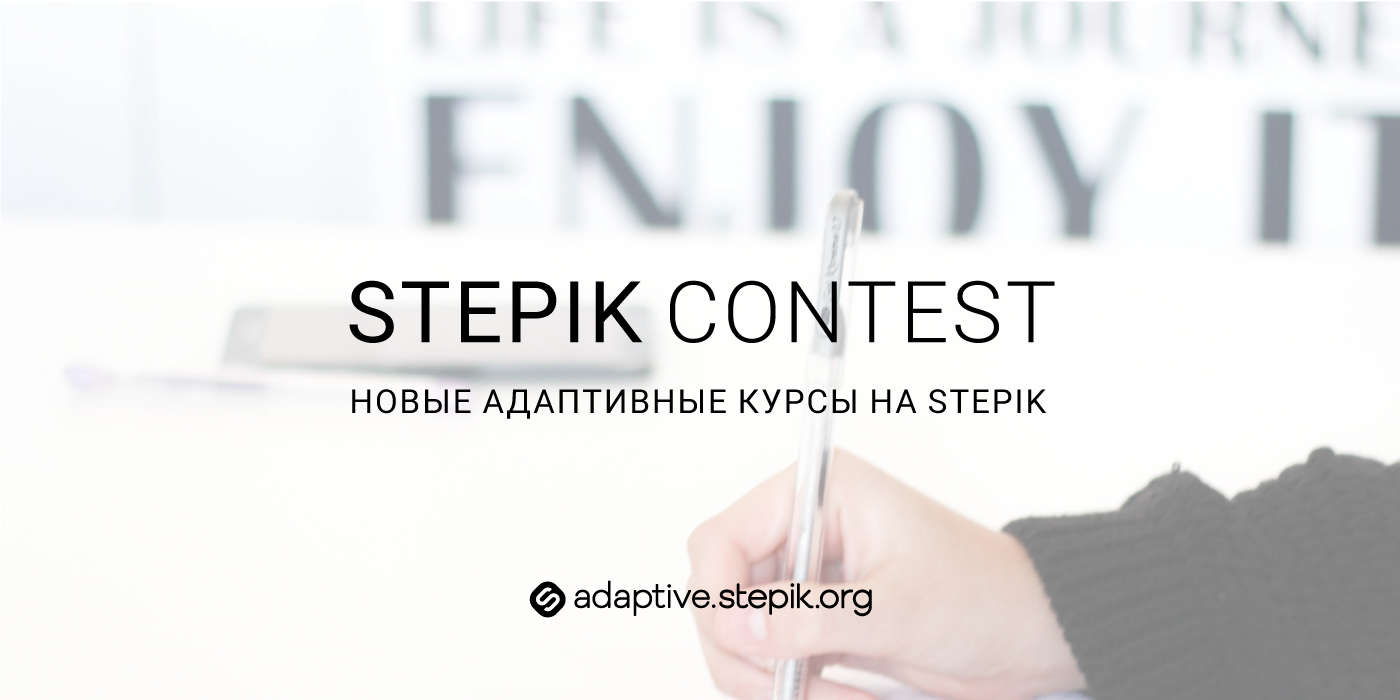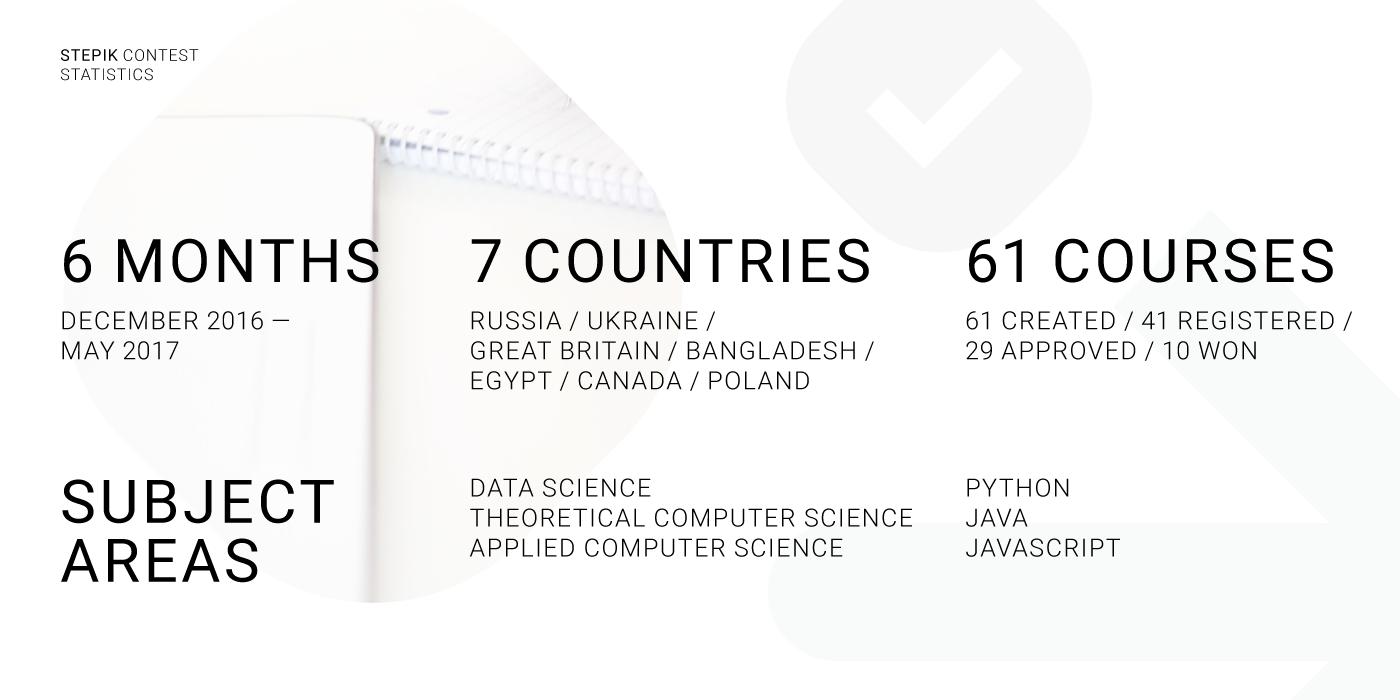Results of the Stepik Contest and new adaptive online courses
From November to May, the Stepik Contest was held on the Stepik platform, the participants of which created lessons for an adaptive learning system, which the Stepik team is now developing and actively implementing. We wrote about the competition earlier , and in this article we want to share the results (new free courses!) And tell about the winners.

To participate in the competition, it was necessary to choose a topic for one of the following nominations (Applied Computer Science, Theoretical Computer Science, Data Science, Python, Java and JavaScript) and create 20+ tasks and several theoretical lessons in English on it. We planned to use the created materials in adaptive education, where educational content and tasks are selected individually for each student, based on his level of knowledge and training, therefore there were special requirements for the lessons to be created:
Initially, we wanted to finish the competition on February 11, 2017, but did not take into account that the holiday period, and then the student session, would greatly limit the time of potential participants, so we extended the deadline until March 31 and did not fail: most of the lessons were created in the last month.
')
During the competition, participants created 61 courses on the platform, the most popular topics were Applied Computer Science (16 courses), Python and Java (11 courses each), but however 41 courses reached the registration stage, and 29 of them met the requirements. The competition was held in English, the geography of the participants was quite diverse - Russia, Ukraine, Great Britain, Bangladesh, Egypt, Canada, Poland.
On March 31, we closed registration and after 10 days presented courses for voting among students of the platform. This was done in order to achieve two goals at once: fair voting and checking whether the created lessons are suitable for adaptive learning. We combined all the lessons into large adaptive courses, and there were 4 of them:
We did not begin to create a course in Python, since in the end only the lessons of Vitaly Polshkov, a student of St. Petersburg State University mathematics and Maths, met all the criteria.
Anyone could take the created courses in adaptive mode and put them likes and dislikes. After a thorough check on the markups (yes, it was like that!) And other methods of dishonest evaluations, we summed up and announced the following winners:
1st place: Artyom Burylov (Russia, Perm), Functional Programming in Java
2 place: Andrei Kochkin (Russia, Moscow), Cryptography
3rd place: Mark Zaslavsky and his team (Russia, St. Petersburg), Git
3rd place: Dmitry Levanov (Russia, Kirov), Collections Framework
3rd place: Dmitry Knyazev (Russia, Moscow), Collections in Java
Then the courses were evaluated by the involved experts, and it became clear how well the lessons learned fit into the proposed adaptive mode.
Following the results in the following nominations included the following authors:
Python: Vitaly Polshkov (Russia, St. Petersburg), Functional Programming in Python
Computer Science: Dmitry Mitin (Ukraine, Kiev), Scala
Computer Science: Anton Bragin (Russia, St. Petersburg), Docker
Data Science Guilia Toti (UK, London), Logistic Regression
Data Science Evgeniya Vorontsova (Russia, Vladivostok), Introduction to Julia
All results are also published on adaptive.stepik.org/results , the winners are awarded with prizes (or in the process of receiving them) and Stepik company certificates.

The Stepik Contest competition not only brought a large number of high-quality courses that can be held in adaptive mode, but also attracted great IT professionals to the ranks of Stepik teachers. Some of them are already preparing new courses, and some even list part of the prize for charity!
Thank you for your attention to the competition, we plan to continue such undertakings. And, as always, users of the platform are invited to learn from new free online courses.
PS: The most attentive readers calculated the number of links to new courses and lessons in this article. They are 16 :)

To participate in the competition, it was necessary to choose a topic for one of the following nominations (Applied Computer Science, Theoretical Computer Science, Data Science, Python, Java and JavaScript) and create 20+ tasks and several theoretical lessons in English on it. We planned to use the created materials in adaptive education, where educational content and tasks are selected individually for each student, based on his level of knowledge and training, therefore there were special requirements for the lessons to be created:
- In one lesson it was necessary to collect tasks of one complexity, at least one task in one lesson.
- All lessons had to be independent of each other, so that each of them could be advised to students at different stages of learning.
- We asked all materials to be tagged with special themes (tags) in order to link together all the lessons created on the platform and help users navigate through them.
Initially, we wanted to finish the competition on February 11, 2017, but did not take into account that the holiday period, and then the student session, would greatly limit the time of potential participants, so we extended the deadline until March 31 and did not fail: most of the lessons were created in the last month.
')
Created lessons and courses. Selection process.
During the competition, participants created 61 courses on the platform, the most popular topics were Applied Computer Science (16 courses), Python and Java (11 courses each), but however 41 courses reached the registration stage, and 29 of them met the requirements. The competition was held in English, the geography of the participants was quite diverse - Russia, Ukraine, Great Britain, Bangladesh, Egypt, Canada, Poland.
On March 31, we closed registration and after 10 days presented courses for voting among students of the platform. This was done in order to achieve two goals at once: fair voting and checking whether the created lessons are suitable for adaptive learning. We combined all the lessons into large adaptive courses, and there were 4 of them:
- Computer Science (decided to combine the two nominations);
- Java , and now it's Adaptive Java with even more tasks;
- Javascript ;
- Data Science .
We did not begin to create a course in Python, since in the end only the lessons of Vitaly Polshkov, a student of St. Petersburg State University mathematics and Maths, met all the criteria.
Anyone could take the created courses in adaptive mode and put them likes and dislikes. After a thorough check on the markups (yes, it was like that!) And other methods of dishonest evaluations, we summed up and announced the following winners:
1st place: Artyom Burylov (Russia, Perm), Functional Programming in Java
2 place: Andrei Kochkin (Russia, Moscow), Cryptography
3rd place: Mark Zaslavsky and his team (Russia, St. Petersburg), Git
3rd place: Dmitry Levanov (Russia, Kirov), Collections Framework
3rd place: Dmitry Knyazev (Russia, Moscow), Collections in Java
Then the courses were evaluated by the involved experts, and it became clear how well the lessons learned fit into the proposed adaptive mode.
Following the results in the following nominations included the following authors:
Python: Vitaly Polshkov (Russia, St. Petersburg), Functional Programming in Python
Computer Science: Dmitry Mitin (Ukraine, Kiev), Scala
Computer Science: Anton Bragin (Russia, St. Petersburg), Docker
Data Science Guilia Toti (UK, London), Logistic Regression
Data Science Evgeniya Vorontsova (Russia, Vladivostok), Introduction to Julia
All results are also published on adaptive.stepik.org/results , the winners are awarded with prizes (or in the process of receiving them) and Stepik company certificates.

The Stepik Contest competition not only brought a large number of high-quality courses that can be held in adaptive mode, but also attracted great IT professionals to the ranks of Stepik teachers. Some of them are already preparing new courses, and some even list part of the prize for charity!
Feedback from participants in the competition:
I always had the desire to try to create my own course; there was a lack of such a push as a competition. An additional challenge was the need to prepare a course in English. In general, it was a very valuable experience - when creating course materials you need to learn a lot about the course, and comments often help to look at the tasks from another, sometimes unexpected, side. And it's very nice when my course turns out to be useful for other people. Evgenia Vorontsova, Ph.D., Far Eastern Federal University, author of the Julia Programming Course.
To consolidate my knowledge. Just awesome. Mainul Islam, Bangladesh, author of courses on Data Science and JavaScript.
It was an interesting experience and the idea of adaptive courses seems very promising, especially in comparison with other MOOC platforms :) Artem Burylov, Java backend developer in the field of developing and protecting payment systems, winner of the competition.
Although I didn’t win, though I didn’t win, I’m not My primary goal is to continue to do so. Mohamed Kamal, Clinical Pharmacist, Egypt, author of the R Programming Course
It was interesting to try myself not only as an active user of the platform, but also as the author of an independent course. Vitaly Polshkov, 1st year student at St. Petersburg State University Mathematics, the author of the course on functional programming in Python.
Learning about the competition on the Stepik platform, I decided that this is a good opportunity to systematize and structure knowledge, to make some contribution to educational open source. Thank you very much Stepik for active positive feedback during the competition. Roman Malizderskyi, hydraulic engineer Kiev, Ukraine, author of the JavaScript course.
I really liked to participate in the Stepik Contest. I thought it was well structured. I know that when I’ve taken an educational platform. It was a good chance to try it. Giulia Toti, a postdoctorate from King’s College in London, author of a course on logistic regression in Data Science.
For our team, the competition was an opportunity to do several things at once that we had long wanted, but we didn’t have enough time to deeply understand StepikAPI and create a Git course that meets our needs. As a result, we managed not only to make the course itself, but it also turned out to make a prototype of the course uploader on Stepik, which allows you to conduct the whole process on the command line and at the same time store the entire course in the version control system. LETI instructors, authors of the course on Git, 3rd place.
Thank you for your attention to the competition, we plan to continue such undertakings. And, as always, users of the platform are invited to learn from new free online courses.
PS: The most attentive readers calculated the number of links to new courses and lessons in this article. They are 16 :)
Source: https://habr.com/ru/post/331708/
All Articles